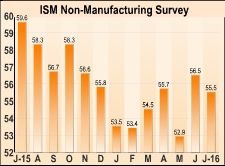Average hourly earnings in New Zealand added 0.8 percent on quarter in the second quarter of 2016, Statistics New Zealand said on Wednesday.
That was shy of forecasts for 0.9 percent following the 0.3 percent increase in the previous three months.
While job numbers have grown, annual wage growth remained subdued in a period of low consumer price inflation.
Annual wage inflation (as measured by the LCI) increased 1.5 percent in the June 2016 year, in line with levels for the past three years. Over the latest June year, the consumer price index, which measures the prices of goods and services that households buy, rose 0.4 percent.
"The gap between the labour cost index and inflation was 1.1 percentage points, the smallest gap since the end of 2014," business prices manager Sarah Williams said.
Labor costs for the private sector added 0.4 percent – unchanged and in line with expectations.
Private wages excluding overtime gained 0.4 percent – unchanged but shy of expectations for 0.5 percent.
Filled jobs were up 3.1 percent on year, driven in part by accommodation and food services, construction, and health services. This compares with a 2.2 percent increase in filled jobs in the year to the previous quarter.
"There were 14,000 more jobs in accommodation and food services, up a strong 11 percent in the June year," Williams said.
by RTT Staff Writer
For comments and feedback: editorial@rttnews.com
Economic News
What parts of the world are seeing the best (and worst) economic performances lately? Click here to check out our Econ Scorecard and find out! See up-to-the-moment rankings for the best and worst performers in GDP, unemployment rate, inflation and much more.




